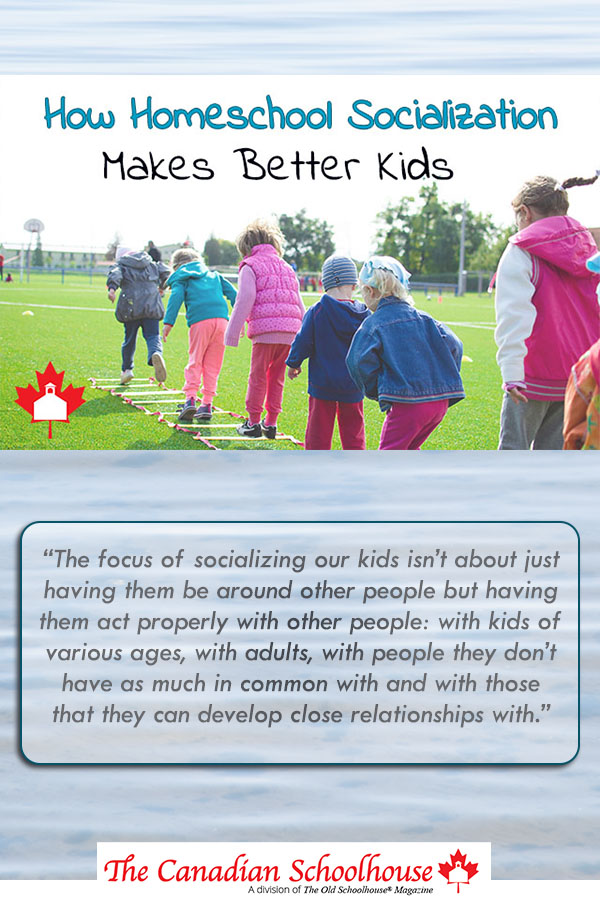

Socializing is highly valued in our society. So much so, that homeschooling parents are often questioned about how their children socialize without the institutional school setting. Even parents themselves get concerned whether they’re providing the best homeschool socialization time for their kids. I think most parents realize that public school isn’t a positive social opportunity unless we’re looking at opportunities to resist temptation, strengthen our kids on how to not be conformed to this world and share the gospel. Even from a secular viewpoint, the daily life for public school students is filled with exposure to mixed values and competing morals.
From my personal experience, not having to endure the social scene of schools, especially high schools, is a major benefit of homeschooling. As a product of the public school system, I will say that elementary school held many social learning experiences that had no benefit for me, and when I hit high school, I was very wrapped up in the social side of school and had little interest in the academic side, which was a complete opposite of my school life in elementary grades. I regularly skipped school, didn’t make much effort to excel in my school work and experimented with a risky mix of street drugs and alcohol that was introduced to me through my social school time.
I also became a mom in my teenage years so you can assume other inappropriate social activities I was into at that time of my life.
Socializing is Important
Without a doubt, I agree that socialization is important to development whether you’re a child or adult. Being around other people is pretty vital to the Christian walk, and the relationships we have with others provides lots of positive situations and support. There are many negative social situations though. I feel that most settings where there are only one or two adults for 20 or more kids tends to leave a lot of room for kids to make inappropriate choices in words and actions.
As I regularly tell my boys, “There’s a reason God gave us parents for our childhood years.We don’t make good choices on our own when we’re young.” The older our kids get the more we give them space to be on their own and to be with friends on their own, but it’s a gradual learning process to act appropriately with others. As parents, we guide them through disciplinary action when they act poorly and reinforce their good behaviour with words, rewards or whatever else is suitable for our parenting style.
When children spend the majority of their waking hours with a BIG group of kids with a low adult supervision (and that adult supervision may not even be inline with the values we’re wanting to instill in our kids), then poor social habits are developed. The focus of socializing our kids isn’t about just having them be around other people but having them act properly with other people: with kids of various ages, with adults, with people they don’t have as much in common with and with those that they can develop close relationships with.
One of the main benefits of homeschooling for our family is that I get to decide on the social situations, and my kids don’t have hours and hours several days of the week where children are forming their own social cliques. I’m pretty aware of what my kids may be doing right or wrong from either being in the same house or area or an adult letting me know about the activities in that small group setting.
And since they are mainly with me, I get to be their main influence to give them instruction in how to develop various life skills.
Why Homeschooling Gives Our Kids the Best Social Time
Parent-led education has many benefits in the area of academics and was the main reason I initially chose to educate my boys. I wanted to allow my boys to learn in their way and not have to conform to the teaching methods that institutional education is limited to. But the longer I homeschool, I become aware of the many more reasons to continue with it until they reach adulthood.
One of the most excellent ones is that socializing is about spending time with our family and other families. I choose, and am usually supervising, other social situations whether it be homeschool events, public events or extended family gatherings. We regularly attend church, visit the library, participate in community sports and take classes and lessons related to our interests.
We have a wide variety of social activities, and most homeschooling families that I know are similarly socialized. We don’t segregate our kids into ages to socialize although kids do still like to hang out with others at a similar developmental level. Children do need correction from time to time while socializing. Homeschooled kids still act inappropriately. However, we get to be much more aware of what our kids need correction or guidance in when we’re around them most of time.
Most kids crave time with other kids. That doesn’t mean that public school is the place to have them thrive socially. I see schools as the poorest example of an appropriate social setting, but students can excel there despite the social oddities. Both my boys regularly ask about going out, getting together with other families or having people over. In no way do I see that as a sign that they don’t get enough social interaction. Just like when they ask to play video games every day does not make me think they don’t have enough video game time.
Our children will think they need many things that they don’t actually need. That’s why they have parents to guide them in the right things. I recently had to discipline my 12-year-old, and this particular offense required a consequence that will hopefully make him clearly recall the result of his disobedience and make him not want to make that poor choice again. When I told him that I wouldn’t be going out of my way to drive him to youth group, you would have thought that I just sentenced him to death row. I momentarily thought it was a bit harsh from his reaction, but social time is a privilege in our household and is granted because our boys show that they can act appropriately.
Homeschooling is not the easy choice. It takes hard work, persistence, focus on the end goal and a lot of patience! For me that patience is mainly needed for myself when I’ve not achieved what I planned, not started what I wanted or not kept my cool when the boys are not very compliant. I get lots of training in patience.
The reward is great though, and having the privilege of recognizing the social needs (the real needs, not what they think they need) of my boys and serving them fully in that capacity is one of the benefits that I’ve just realized the benefits of in the last couple of years. Children thrive in homeschool socialization which is one area of learning that will be a major factor in being a successful adult.
Sibling time is one of the constant social scenes I get to oversee. I love watching my boys grow together and enjoy each other’s company. One of my life mottos is “family first,” and that’s the heart of homeschool socialization – having strong relationships with family. This strength in family relationships helps our kids with the skills and confidence to properly navigate the sometimes dicey social scenes outside of the home. Interacting with people of all ages and various backgrounds is a fairly easy task for the homeschooler and, in my opinion, is what makes home education the best choice for teaching effective socialization to our children.
 Stephanie Morrison has been building businesses, mostly from home, for over 10 years, motivated by her strong determination that her two youngest boys would be educated at home. She works for The Old Schoolhouse® on the Canadian team, and also coaches entrepreneurs to start and grow their business from home. Her and her family are all comfortably nestled in the trees in Central Ontario. She loves being a home-body and building up her permaculture property. Learn more about Steph at www.creatingworkandplay.com
Stephanie Morrison has been building businesses, mostly from home, for over 10 years, motivated by her strong determination that her two youngest boys would be educated at home. She works for The Old Schoolhouse® on the Canadian team, and also coaches entrepreneurs to start and grow their business from home. Her and her family are all comfortably nestled in the trees in Central Ontario. She loves being a home-body and building up her permaculture property. Learn more about Steph at www.creatingworkandplay.com















